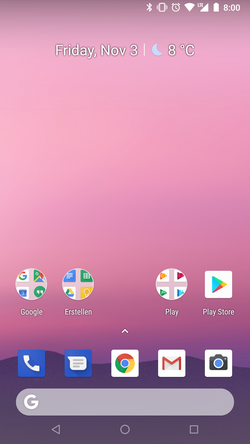
Back أندرويد أوريو Arabic অ্যান্ড্রয়েড ওরিও Bengali/Bangla Android Oreo Catalan ئەندرۆید ئۆریۆ CKB Android Oreo Czech Android Oreo German Android Oreo Greek Android Oreo Spanish اندروید اوریو FA Android Oreo French
| Version of the Android operating system | |
 | |
 Android 8.1 home screen with Pixel Launcher | |
| Developer | |
|---|---|
| General availability | August 21, 2017[1] |
| Final release | 8.1.0_r93 (OSN1.210329.015)[2] / October 4, 2021 |
| Final preview | 8.1.0 (OPP6.171019.012) / November 27, 2017 |
| Kernel type | Monolithic (Linux) |
| Preceded by | Android 7.1.2 "Nougat" |
| Succeeded by | Android 9 "Pie" |
| Official website | www |
| Support status | |
| Unsupported as of October 4, 2021 | |
Android Oreo (codenamed Android O during development) is the eighth major release and the 15th version of the Android mobile operating system.
It was initially unveiled as an alpha quality developer preview in March 2017 and later made available to the public, on August 21, 2017.
It contains a number of major features, including notification channels, picture-in-picture support for video, performance improvements, and battery usage optimization, and support for autofillers, Bluetooth 5, system-level integration with VoIP apps, wide color gamuts, and Wi-Fi Aware. Android Oreo also introduces two major platform features: Android Go – a software distribution of the operating system for low-end devices – and support for implementing a hardware abstraction layer.
As of August 2023 Android Oreo (which has ceased receiving security updates as of October 2021) ran on a combined 4.36% of Android devices (1.07% on Android 8.0 and 3.21% on Android 8.1).[3]
- ^ Burke, Dave (August 21, 2017). "Introducing Android 8.0 Oreo". Android Developers Blog. Archived from the original on September 20, 2019. Retrieved August 28, 2018.
- ^ "Android Source". Google Git. Archived from the original on February 3, 2023. Retrieved August 3, 2021.
- ^ "Mobile & Tablet Android Version Market Share Worldwide". StatCounter Global Stats. Archived from the original on May 13, 2022. Retrieved February 14, 2023.